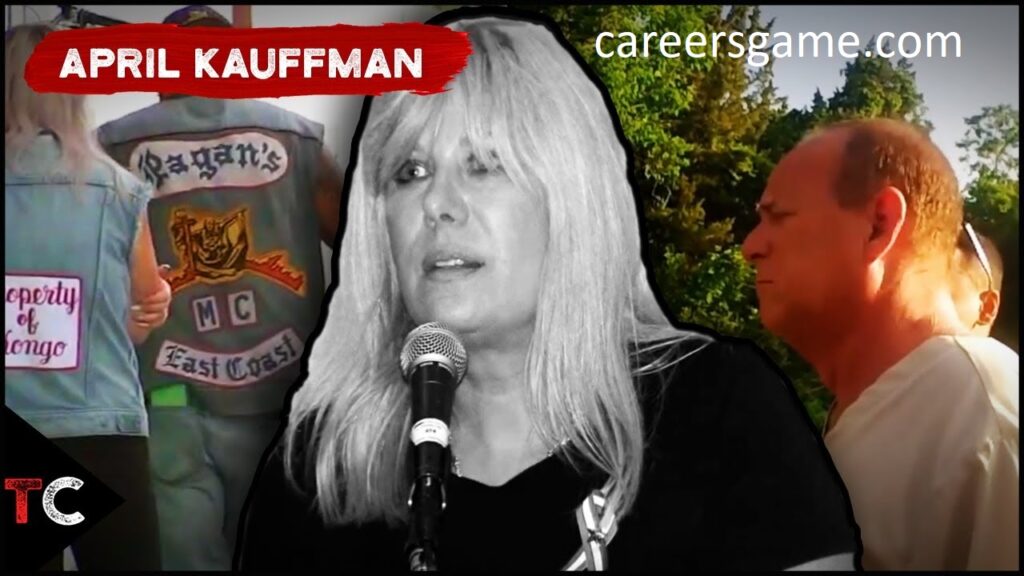The tragic death of April Kauffman, a well-known New Jersey radio host and philanthropist, shocked the community and ignited one of the most complex and chilling murder investigations in the state’s recent history. What initially seemed like a personal tragedy, a case of domestic violence gone wrong, eventually unfolded into a sinister story of betrayal, corruption, and organized crime. It took years for the full truth to come to light, but the pursuit of justice for April Kauffman ultimately revealed a tale of deception that gripped the public’s attention.
A Vibrant Life Cut Short
April Kauffman was no ordinary woman. Born in 1955, she was an accomplished radio personality, a beloved community figure, and a fierce advocate for veterans. Kauffman’s radio program, “The April Kauffman Show,” featured interviews with local veterans, their families, and community leaders. She used her platform to shed light on issues such as veterans’ healthcare, homelessness, and mental health. Her commitment to supporting military veterans and her philanthropic efforts in the Atlantic City area made her a respected figure in the community.
Kauffman was also a devoted wife and mother, though her personal life was not without its difficulties. Her marriage to James “Jim” Kauffman, a well-known doctor in the area, had become increasingly strained over the years. Those close to April had begun to notice signs of emotional and physical abuse within the relationship. Despite these struggles, Kauffman continued to work tirelessly to support causes she believed in, maintaining a reputation as a compassionate and driven woman.
But on May 10, 2012, her life was violently cut short. April Kauffman was found dead in her Linwood, New Jersey, home, with a gunshot wound to the chest. Her death was initially deemed a suicide, but there were several factors that did not add up. She had been found lying face down in her bedroom, and there were signs of a struggle. Her family and close friends were convinced that something more sinister was at play, and the investigation soon revealed a much darker story.
The Unfolding Investigation
At first, law enforcement investigators treated Kauffman’s death as a suicide, a conclusion that many found hard to accept given her background and the circumstances surrounding her death. As they dug deeper into her life, they uncovered a series of troubling facts. April had a history of reporting threats from her husband, Jim Kauffman, who had been a source of conflict in their marriage. She had also been outspoken about her suspicions that Jim had ties to organized crime, particularly a group of outlaw motorcycle gang members involved in drug trafficking.
These revelations piqued the interest of investigators, who began to revisit the case with a more critical eye. They discovered that Jim Kauffman had been abusing prescription drugs, and that April had been planning to divorce him at the time of her death. Furthermore, a key piece of evidence emerged: Jim Kauffman had been linked to a number of criminal activities, including illegal gambling and connections with the Pagans Motorcycle Club. Kauffman was also known to have had ties to a local drug dealer, whose involvement with organized crime seemed to run deep.
It soon became clear that Jim Kauffman’s possible motive in his wife’s death was far more than just an unhappy marriage. In the years following April’s death, investigators uncovered a web of deceit involving drugs, extortion, and organized crime that ultimately led to the murder.
The Role of Frank Lilo and the Organized Crime Connection
As investigators dug further, they found that Jim Kauffman was not acting alone. The investigation revealed the involvement of Frank Lilo, an associate of the Pagans Motorcycle Club, who had been tasked with killing April Kauffman. Lilo, a convicted felon with ties to organized crime, had been promised a substantial payout for carrying out the murder. The plot to kill April was linked to her knowledge of Jim Kauffman’s criminal activities, particularly his ties to drug dealing and the motorcycle gang.
What emerged was a shocking revelation: Jim Kauffman, fearing his wife’s impending divorce and her potential to expose his criminal activities, had orchestrated her murder. In exchange for carrying out the killing, Frank Lilo had been promised money and protection. Jim Kauffman was alleged to have hired Lilo to carry out the murder, knowing that the violent death would shield him from the fallout of a divorce and keep his illicit dealings hidden.
The involvement of organized crime added a layer of complexity to the case, as it became clear that Kauffman had been living a double life—one that involved both professional success and deep involvement in illegal activities. The intertwining of personal betrayal, domestic violence, and organized crime made April’s murder one of the most complicated and high-profile cases in New Jersey’s history.
A Break in the Case
The case lay dormant for several years, but in 2017, a breakthrough occurred. Frank Lilo was arrested on charges unrelated to the Kauffman case, and during his time in custody, he began cooperating with authorities. In exchange for a reduced sentence, Lilo admitted to his role in April’s murder and provided investigators with crucial details about the conspiracy.
Lilo’s confession provided the missing link in the investigation. His testimony implicated Jim Kauffman as the mastermind behind the murder, and he revealed the extent of the corruption and criminal activity surrounding the case. As a result, Jim Kauffman was arrested and charged with first-degree murder in 2017, five years after his wife’s death.
The arrest of Jim Kauffman sent shockwaves through the community. Many had suspected his involvement, but the full extent of his criminal activity was even more disturbing than anyone had imagined. In addition to the murder charge, Kauffman faced charges of conspiracy, racketeering, and being involved in organized crime. The case highlighted how far some individuals would go to protect their criminal enterprises, even if it meant taking the life of a loved one.
The Trial and Aftermath
In 2019, Jim Kauffman stood trial for the murder of his wife. The prosecution laid out a compelling case, with Lilo’s testimony, along with other evidence, painting a clear picture of Kauffman’s involvement. After a lengthy trial, Kauffman was convicted of first-degree murder and sentenced to life in prison without the possibility of parole.
April Kauffman’s family and friends were left to grapple with the aftermath of her tragic death. While the conviction provided a sense of justice, it did little to heal the deep wounds caused by the loss of a beloved woman who had dedicated her life to helping others. Her death was a reminder of the hidden dangers that can exist in seemingly normal lives and the complex web of relationships that can lead to tragedy.
Conclusion
The death of April Kauffman, once thought to be a suicide, turned out to be a tragic and complicated murder orchestrated by those closest to her. Through years of investigation, the truth about her life, her marriage, and the organized crime connections that led to her death came to light. The case of April Kauffman serves as a reminder of the dark realities that can lurk beneath the surface of everyday life, and how even the most dedicated individuals can become victims of betrayal and violence.
While the conviction of Jim Kauffman and his accomplices brought some measure of justice, it cannot undo the harm caused by his actions. The legacy of April Kauffman, however, endures—through her advocacy for veterans, her work in the community, and the ongoing fight for justice in her name. The mystery of her death has been unraveled, but her story continues to resonate as a powerful reminder of the lengths to which some people will go to protect their secrets.



